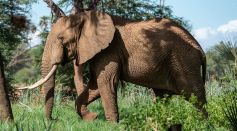ENVIRONMENT & CLIMATE
Sea Cucumber Shoots Silky, Sticky Substance From Its Butt to Defend Itself From a Crab [Watch]

Environmental Protection Agency Has New Standards That Will Boost Electric Vehicles Sales, Phase Out Gas-Powered Cars

Elephant Learned to Peel Bananas; Scientists Argue They Might Be the Only Non-Primate Self-Domesticated Animals
Rare Bigfin Squid Spotted in Lost City Hydrothermal Vent Field [Watch]
![Climate Change Enhances Baseball Performance Due to Warmer Temperatures That Reduce Air Density, Causing Balls To Fly Farther [Study]](https://d.sciencetimes.com/en/full/45863/climate-change-enhances-baseball-performance-due-warmer-temperatures-that-reduce-air-density.jpg?w=237&h=131&f=9c3b5eb6747cb2335d931fe72548e92f)
Climate Change Enhances Baseball Performance Due to Warmer Temperatures That Reduce Air Density, Causing Balls To Fly Farther [Study]

Amazing Footage Shows Elephant Peeling Banana With Her Trunk; How Intelligent Could These Creatures Become?

Mouth Sizes of Extant Sharks Do Not Predict Body Dimensions of Ancient Arthrodire Placoderms like Dunkleosteus, Study Says

Plant-eating Dinosaurs Could Have Evolved To Be Even Larger, Reaching 100 Tonnes

Fisherman Escapes 15-Foot Crocodile by Gouging Beast's Eyes; How to Survive a Croc's Attack
41-Foot Gray Whale's Cause of Death Revealed After Necropsy; Biologist Explains Stranding

Ancient Ocean Floor Is Covering the Boundary Between Earth’s Core and Mantle, Study Suggests

17-Meter-Long Sperm Whale Died in Bali After Being Stranded; How Often Do These Marine Mammals Wash Up on Beaches?

Ancient Europeans Took Hallucinogenic Drugs 3,000 Years Ago, Study Says; This May Have Led to Hallucinations, Delirium

3 Outrageous Conspiracy Theories
Most Popular

Catch The Blood Moon: Where and When to See the Total Lunar Eclipse on March 3, 2026

Rare Blood Moon Lunar Eclipse Illuminates the Skies Over North America

The Neuroscience of Habit Formation: What Behavior Science Reveals About How the Brain Builds Routines

How Ocean Currents Shape Climate Patterns and Drive Weather Science on Land




